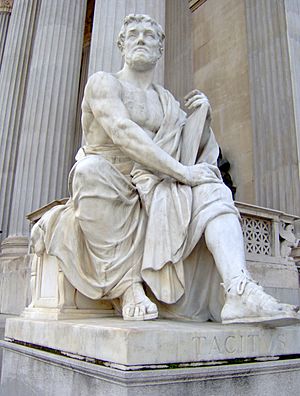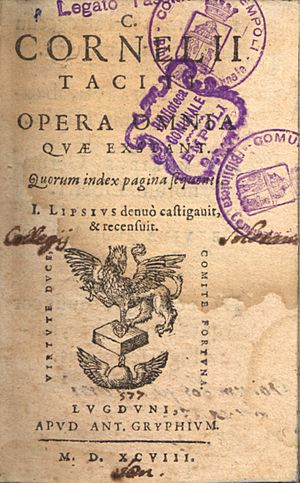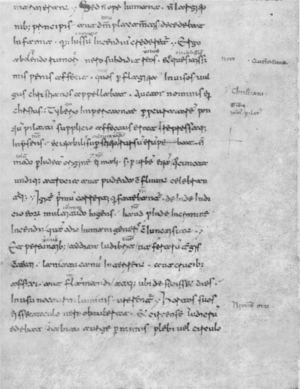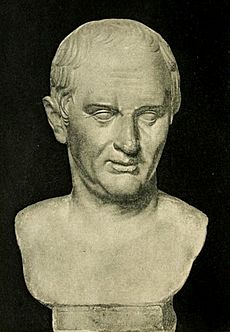Tacitus facts for kids
Quick facts for kids
Cornelius Tacitus
|
|
|---|---|

|
|
| Born | c. 56 AD |
| Died | c. 120 AD (aged approx. 64) |
| Occupation | Historian, politician |
|
Notable work
|
Agricola Annals Dialogus de oratoribus Germania Histories |
| Scientific career | |
| Influences |
|
| Influenced | Virtually all of subsequent historical inquiry in the Western World |
Publius Cornelius Tacitus, often called just Tacitus, was a famous Roman historian and politician. He lived from about 56 AD to 120 AD. Many experts today think he was one of the greatest Roman historians ever.
His most important works are the Annals and the Histories. These books tell us about the Roman emperors Tiberius, Claudius, Nero, and the emperors who ruled in the year 69 AD. Together, these works cover the history of the Roman Empire from the death of Augustus (14 AD) to the death of Domitian (96 AD). Some parts of his writings are missing today.
Tacitus also wrote about other topics. He wrote about public speaking in a book called Dialogus de oratoribus. He described the lands and people of Germania in his book De origine et situ Germanorum. He also wrote about the life of his father-in-law, Agricola. Agricola was a general who helped the Romans conquer much of Britain. Tacitus's Annals is also important because it mentions the persecution of Christians and is one of the earliest non-Biblical mentions of the crucifixion of Jesus.
Contents
Tacitus: Roman Historian
Who Was Tacitus?
We don't know a lot about Tacitus's personal life. Most of what we know comes from small hints in his own books. We also learn things from letters written by his friend, Pliny the Younger. An old stone carving found in Mylasa also gives us some clues.
Tacitus was born in 56 or 57 AD. His family was part of the Roman equestrian class, which was a wealthy and important group. We don't know exactly where he was born or his first name. Some old writings call him Gaius, but most important copies of his work call him Publius.
His Early Life and Family
Many old noble families in Rome didn't survive the difficult times at the end of the Roman Republic. Tacitus made it clear that he became important thanks to the Flavian emperors. Some people thought he might have been related to a freed slave, but this is generally not believed by historians.
One scholar thought Tacitus might be related to Thrasea Paetus. This family was from Etruria, and Tacitus spoke highly of them. Also, some later members of that family had the name Tacitus. This could mean they were related.
His father might have been a man named Cornelius Tacitus. This Cornelius was a governor in Gallia Belgica and Germania. Pliny the Elder mentioned that Cornelius had a son who grew old very quickly. This might mean that son died young. We don't know if this was Tacitus himself or a brother.
Because Tacitus and Pliny the Younger were good friends, some experts think they both came from rich families in the Roman provinces. We don't know which province Tacitus was born in. Some guesses include Gallia Belgica, Gallia Narbonensis, or northern Italy. His marriage to the daughter of a senator from Narbonensis suggests he might have been from there.
Some people think Tacitus was a Celt. This is because Celts were known for their great public speaking skills. Also, Tacitus wrote about barbarians who fought against Roman rule in a way that showed understanding.
Tacitus's Career and Marriage
When Tacitus was young, he studied rhetoric in Rome. This was to prepare him for a career in law and politics. He might have studied with the famous teacher Quintilian.
In 77 or 78 AD, Tacitus married Julia Agricola. She was the daughter of the famous general Agricola. We don't know much about their home life, but Tacitus enjoyed hunting and being outdoors.
He started his political career under Emperor Vespasian (who ruled from 69–79 AD). He became a quaestor (a financial officer) in 81 or 82 AD under Emperor Titus. Tacitus moved up steadily in his career. He became a praetor (a high-ranking official) in 88 AD. He also joined a group of priests in charge of important religious books and games.
Tacitus became well-known as a lawyer and a speaker. It's interesting because his last name, Tacitus, means "silent" in Latin!
He worked in the Roman provinces from about 89 to 93 AD. He might have been in charge of a legion (a large army unit) or a civilian job. He and his property survived the difficult rule of Emperor Domitian (81–96 AD). But this experience made him feel sad and perhaps ashamed. It also made him hate tyranny, which you can see in his writings.
In 97 AD, during the rule of Emperor Nerva, Tacitus became a consul. This was a very high position, and he was the first in his family to achieve it. During this time, he became even more famous as a speaker. He gave a funeral speech for a well-known soldier named Lucius Verginius Rufus.
The next year, he published his books Agricola and Germania. These books showed what kind of writer he would become. After this, he took a break from public life. But he returned during Emperor Trajan's rule (98–117 AD). In 100 AD, he and his friend Pliny the Younger helped put a corrupt governor on trial. Pliny later wrote that Tacitus spoke "with all the majesty which characterizes his usual style of oratory."
Tacitus then took a long break from politics and law to write his major works, the Histories and the Annals. From 112 to 113 AD, he held the highest civilian governorship. He was the governor of the Roman province of Asia (in modern-day Turkey). This is known from the stone carving found in Mylasa.
A passage in his Annals suggests he died sometime after 116 AD. He might have lived until 125 or even 130 AD. It seems he lived longer than both Pliny and Trajan. We don't know if Tacitus had any children.
What Did Tacitus Write?

Five of Tacitus's works have survived, though some parts are missing. His most important books are the Annals and the Histories. Here are his known works and their approximate dates:
- (98 AD) De vita Iulii Agricolae (The Life of Agricola)
- (98 AD) De origine et situ Germanorum (Germania)
- (102 AD) Dialogus de oratoribus (Dialogue on Oratory)
- (105 AD) Historiae (Histories)
- (117 AD) Ab excessu divi Augusti (Annals)
The Annals and Histories
The Annals and the Histories were meant to be one large work of thirty books. Even though Tacitus wrote the Histories first, the events in the Annals happened earlier. Together, they tell a continuous story from the death of Augustus (14 AD) to the death of Domitian (96 AD). Most of these books are lost, but what remains is a very important record of that time. It's amazing that the surviving parts of the Annals made it to us at all, as they came from single old manuscripts.
About the "Histories"
In an early part of his Agricola, Tacitus said he wanted to write about the years of Domitian, Nerva, and Trajan. In the Histories, he changed his plan. He decided to cover the period from the civil wars of the Year of the Four Emperors (69 AD) and end with the rule of the Flavians. Only the first four books and part of the fifth book have survived. These cover the year 69 AD and the beginning of 70 AD. The work was probably meant to go up to Domitian's death in 96 AD. The fifth book includes a short description of the ancient Jews. This is a valuable record of how Romans viewed them.
About the "Annals"
The Annals was Tacitus's last work. It covers the period starting from the death of Augustus in 14 AD. He wrote at least sixteen books, but many are missing. For example, books 7–10 and parts of books 5, 6, 11, and 16 are gone. Book 6 ends with the death of Tiberius. Books 7–12 probably covered the reigns of Caligula and Claudius. The remaining books cover the rule of Nero. We don't know if Tacitus finished the entire work. He died before he could complete his planned histories of Nerva and Trajan. The Annals is one of the earliest non-religious historical records to mention Christ. Tacitus mentions him when talking about Nero's persecution of Christians.
Other Important Writings
Tacitus wrote three other works that were shorter and focused on specific topics. These are Agricola, a biography of his father-in-law; Germania, a book about the lands and tribes of barbarian Germania; and the Dialogus, a discussion about the art of public speaking.
"Germania"
The Germania is a book about the Germanic tribes who lived outside the Roman Empire. It's part of a tradition of writing about different cultures, like the works of Herodotus and Julius Caesar. The book starts by describing the lands, laws, and customs of these tribes. Later, it focuses on specific tribes. It begins with those closest to the Roman Empire and ends with those living near the Baltic Sea. Tacitus wrote a similar, but shorter, section in his Agricola.
"Agricola"
The Agricola (written around 98 AD) tells the life story of Gnaeus Julius Agricola. He was a famous Roman general and Tacitus's father-in-law. The book also briefly describes the geography and people of ancient Britain. Like in Germania, Tacitus compares the freedom of the native Britons to the problems and corruption of the Roman Empire. The book includes strong arguments against Rome's greed. One famous quote, which Tacitus says came from a speech by Calgacus, ends with: "To ravage, to slaughter, to usurp under false titles, they call empire; and where they make a desert, they call it peace."
"Dialogue on Oratory"
We are not sure exactly when Tacitus wrote Dialogus de oratoribus. It's different from his other works, so some people have wondered if he really wrote it. It was probably an early work, influenced by his training in public speaking. Its style is similar to that of the great Roman speaker Cicero. The Dialogus is dedicated to Fabius Iustus, who was a consul in 102 AD.
Tacitus's Writing Style
Tacitus's writings are known for their strong and direct language. He usually doesn't add extra details or flowery words, unlike some other writers of his time. For example, when he writes about a Roman army almost losing a battle in Annals I,63, he describes it very briefly.
In most of his books, he tells events in the order they happened. He rarely gives a big picture overview, leaving readers to figure that out themselves. However, when he does use broad descriptions, like at the beginning of the Annals, he uses short, powerful sentences that get right to the point.
How He Wrote History
Tacitus's way of writing history was influenced by Sallust. His historical writing gives deep, often serious, insights into how power politics work. He combines simple descriptions of events with moral lessons and dramatic stories.
Scholars have discussed a lot whether Tacitus was "neutral" in his writing. He often focused on the balance of power between the Roman Senate and the emperors. He also wrote about how the ruling classes in Rome became more corrupt as the empire grew richer and more powerful. Tacitus believed that senators gave up their right to speak freely to please their emperors, who were rarely kind.
Tacitus noticed that emperors relied more and more on the loyalty of their armies. The Julio-Claudian emperors eventually gave way to generals. These generals, like Julius Caesar, realized that military strength could give them political power in Rome.
Tacitus's political career happened mostly during the rule of Emperor Domitian. His experience with the harshness, corruption, and bad behavior of that time (81–96 AD) might explain why his political analysis is often bitter and ironic. He shows us the dangers of power without being held accountable. He also warns about loving power too much and the laziness and corruption that come from too much wealth.
However, the way he describes Tiberius in the first six books of the Annals is not always negative. Most scholars see Tiberius as mostly positive in the early books, and then more negative after the plots of Sejanus. In the first chapters, Tiberius and his officials seem dishonest. But in later books, Tacitus shows some respect for how clever the old emperor was at keeping his position.
Tacitus generally isn't afraid to praise and criticize the same person. He often points out both their good and bad qualities. One of his special traits is that he avoids taking a final side for or against the people he describes. This has led some to see his works as both supporting and rejecting the imperial system.
His Unique Latin Style
His Latin writing style is highly praised. It has a grand and elegant feel because of his training in public speaking. But it's also very short and to the point. His sentences are rarely flowing or beautiful, but their meaning is always clear. Some have called his style "harsh, unpleasant, and thorny," while others praise it as "serious, concise, and powerfully eloquent."
Compared to the Latin of the Ciceronian period, where sentences were often very long and complex, Tacitus's style is short and direct. It's also very unique. He uses different ways to say "and" in one line, and he arranges words in a way that breaks traditional Latin rules. Some readers find this annoying, but others find it exciting and interesting.
His historical works focus on why people acted the way they did. He often gives deep insights, though it's hard to know how accurate they are. He is best at showing when people are being dishonest or pretending. For example, he tells how Tiberius refused the title "father of the country." Then he immediately mentions a law that punished "treasonous" speech or writings, and how silly trials resulted from it (Annals, 1.72). Elsewhere (Annals 4.64–66), he compares Tiberius's public help for fire victims to his failure to stop the corruption and unfairness he had started. While this kind of insight has earned him praise, he has also been criticized for sometimes ignoring the bigger picture.
Tacitus learned a lot from Sallust in both language and method. Later, the historian Ammianus Marcellinus wrote in a style most similar to Tacitus.
See also
 In Spanish: Tácito para niños
In Spanish: Tácito para niños
- The Republic (Plato): Tacitus's thoughts on ideal government ideas.
- Tacitus on Christ: A well-known part of the Annals that mentions the death of Jesus of Nazareth (Ann., xv 44).
- Claude Fauchet: The first person to translate all of Tacitus's works into French.
- Justus Lipsius: He created a very important early modern edition of Tacitus's works (1574).



